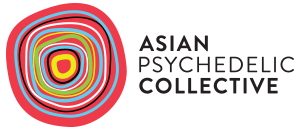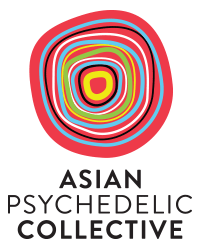A Living GUIDE FOR ASIAN AMERICANS WHO USE PSYCHEDELICS.
This guide serves the Asian American community by providing education on harm reduction in the context of psychedelic use. Its goal is to create safer environments for Asians to explore psychedelics while considering our unique positionality in the United States and globally. Currently, culturally sensitive resources like these are limited and often difficult to access.
Written by Mitsu Puri
Reviewed and Edited by Ahoo Yara, Aysu Naz Atalay, Oriana Filiaci, Preeti Simran Sethi & Terence Ching.
Email us at hello@asianpsychedeliccollective.org to provide feedback or contribute to this guide.
For people of Asian descent (East, West, South, Southeast, Central, multicultural, diaspora), tending to our mental health is a radical act. We have been conditioned to believe that talking about our mental health struggles is shameful. In order to feel accepted by our family units and society at large, we often feel compelled to suppress and repress, striving to appear well-adjusted, high-achieving, and rule-abiding.
This internalized pressure drives us to chase an unattainable ideal of perfection. Lack of open discourse about mental health amongst the Asian diaspora perpetuates the misconception that we do not experience these challenges. Consequently, many struggles remain hidden, causing members of our community to fall through the cracks. It’s time to challenge this silence and prioritize our mental well-being.
The staggering statistic that suicide is the eighth leading cause of death among Asian Americans highlights the urgent need to confront false narratives surrounding mental health (APA, 2022). In fact, in 2019, suicide was the leading cause of death for Asian/Pacific Islanders aged 15 to 24 (Office of Minority Health, U.S. Department of Health and Human Services). Southeast Asian refugees have been identified as at-risk for post-traumatic stress disorder (PTSD) due to trauma associated with immigration to the United States, a phenomenon referred as “silent trauma” (National Institutes of Health). There are countless other studies regarding Asian Americans and the Asian diaspora demonstrating the dire need of mental health destigmatization and access to culturally responsible care.
Those of us who ally with psychedelics on the healing journey face additional marginalization due to stigma and shame surrounding drug use within our communities. This stigma is rooted in racism and the legacies of colonialism and imperialism, which continue to shape drug policy and perceptions of drug use today.
The combination of stigma and systemic racism creates significant barriers to accessing adequate harm reduction services in our communities. In particular, the model minority myth, and a lack of open discourse around mental health and drug use within the Asian diaspora, reinforces the erroneous belief that people in our communities do not use drugs.
Many of our traditional customs and practices involving sacraments were re-interpreted through a colonial lens, deemed as evil and barbaric. In much of pre-colonial Asia, for instance, cannabis was cultivated, traded and used as medicine, playing a sacred role in Sufi and Hindu traditions (Harm Reduction Journal). Similarly, Peganum harmala (wild rue, Syrian rue, African rue), known for its stimulating and hallucinogenic properties similar to the South American psychoactive brew Ayahuasca, may have been significant in Sufi practices for centuries. The plant has also been considered—though with some skepticism—as a possible candidate for the mysterious ‘Soma’ described in the Rig-Veda, one of four sacred canonical Hindu texts, or ‘Haoma’ of the old Persian Zoroastrian ceremonies. Additionally, hallucinogenic plants have been discovered in traditional Chinese herbal medicine practices (Botanical Museum Leaflets).
“How can we begin to address deeply rooted stigma around mental health and drug use in our communities while simultaneously tending to our own wounds with the careful use of psychedelics?”
It is important to reflect on why you use psychedelic drugs and how you can reduce harm when you do. Below are a few questions to prompt self-reflection.
𓋼 Which psychedelic substances have I used in the past and which ones do I still use? What are the benefits I have received from these experiences? What are some harms I have experienced?
𓋼 What am I really yearning for when I engage with psychedelics? What does my use of these substances reveal to me about myself?
𓋼 Drug use is an expression of me trying to find __________. How else can I resource my needs? What are my other paths?
𓋼 How can I reduce harm and keep myself safe as I engage with these substances?
𓍊 Rooted in justice and human rights, harm reduction is a broad set of practical strategies implemented to reduce the negative health, social and/or legal consequences related to substance use (Harm Reduction Coalition). The harm reduction model acknowledges that substance use is a part of our world and aims to move towards acceptance and destigmatization; and informed, responsible and less risky drug use. It involves empowering people who use drugs to make their own choices, and contribute to societal narratives and policies. A comprehensive list of the principles of harm reduction can be found on harmreduction.org, and manuals on harm reduction in a variety of languages can be found on Harm Reduction International. Testing your substances is low-cost, simple to do and can save lives. Testing kits are available for purchase on DanceSafe.org.
𓋼 In what ways does colonization show up in my relationship to psychedelic substances and altered states of consciousness?
A big thank you to Hsing Yi Fu & Rhana Hashemi at the Center for Political Drug Education for sharing some of these questions with us as part of their Asian American Drug War Healing Circle curriculum.
Talking to friends and partners.
Psychedelic journeys can be incredibly personal and choosing to share this part of yourself with someone can be a vulnerable and sacred act. It can also be empowering and help you to process your experiences with someone you trust. It is wise to use discernment when opening up about these experiences. When deciding whether to speak with friends or partners, here are a few questions you can ask yourself.
𓋼 Despite a shared history with this person…
𓍊 Do I feel safe with them? Try to tune into the signals your body is sending to you as you think about sharing this vulnerable part of yourself with them.
𓍊 Are they able to maintain an open mind and hear me with compassion and non-judgment?
𓋼 Do they also engage with psychedelics? What have their experiences been like?
Talking to family members.
Easing into the conversation.
𓋼 You may begin by first gauging what their existing religious, cultural or personal beliefs and values are regarding mental health and substance use. You may find that you share certain beliefs and values. Validating these may help generate compassion for their lived experiences and give you more insight into why you engage with these substances yourself. You may also offer gratitude for how they have helped shape your perspective.
𓋼 You can engage them in an informative discussion on the legacy of colonialism and how it has shaped society’s perceptions of psychedelic use. You may also help cultivate compassion surrounding drug use by discussing with them the history and impact of the War on Drugs today. You can learn more through organizations such as the Drug Policy Alliance.
𓋼 The psychedelic space is brimming with misconceptions. Address any myths they may have by sharing with them resources and articles on psychedelics you think may help to inform them on current research and the movement at large. You can find more resources and information on our Resources page.
𓍊 Safety profile of psychedelics and current clinical research findings. Current research has increasingly suggested that psychedelics may be beneficial in supporting physical, psychological and spiritual dimensions of wellbeing. From exploring mental health diagnoses such as depression and substance use disorders, to unpacking epigenetic and intergenerational trauma, to consciousness exploration, people use psychedelics in our late modern society for a broad range of reasons.
𓍊 History of the use of psychedelics in indigenous communities, and the multiple waves of the psychedelic renaissance. The mainstream narrative of psychedelics accentuates knowledge derived from a white-dominant medical framework, disregarding centuries old relationships indigenous communities have had with plant-based psychedelic medicines (Chacruna). We honor and are indebted to the continued resilience of the Indigenous peoples who steward these medicines in the face of violent colonization and oppression.
𓍊 Organizations engaging in psychedelic science, education and community building (e.g. Chacruna, Multidisciplinary Association of Psychedelic Studies, Global Psychedelic Society).
Coming out as a psychedelic user.
𓋼 After some self-reflection, share with them your personal reasons for using these substances. You may choose to share moments from experiences that have urged your continued exploration of these medicines.
𓋼 If you have struggled with physical, mental or spiritual health challenges in the past and/or continue to do so, you may share with your family ways in which these medicines have supported your healing and growth.
Finding community.
𓋼 Seeking refuge in communities where you can openly talk about your mental health struggles and your use of psychedelic substances can help decrease the burden of managing on your own. It can also help reduce harm and, process and integrate experiences.
𓋼 Reach out to us or find a community near you or online through the Global Psychedelic Society.
Updated on September 22, 2024.
DISCLAIMER
APC does not promote the use of legal or illegal psychoactive substances. This content has been created strictly for harm reduction strategies, education and community support and is not a substitute for medical, psychological, psychiatric diagnoses, treatment or advice.
Every drug has risks and benefits, and we believe it is your responsibility to make informed decisions. In the words of Sasha Shulgin, a pioneering psychedelic chemist, “be informed, then choose.”
Your safety and wellbeing are important. Fireside Project is a psychedelic peer support line that provides emotional support during and after psychedelic experiences. They are staffed by rigorously trained, compassionate and supportive volunteers from diverse backgrounds and will be able to provide you with appropriate support and resources.
Call or text 62-FIRESIDE. Open everyday 11:00am - 11:00pm PT.
If you are in crisis or if you or any other person may be in danger or experiencing a mental health emergency, immediately call 911 (USA) or your local emergency resources. If you are experiencing a medical emergency, please seek medical attention.

